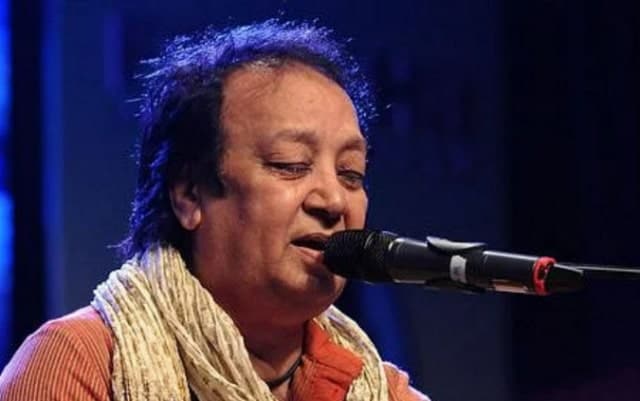Bhupinder Singh had a voice like no other. His music evokes long-forgotten memories and a simpler, saner world. He has given some of Hindi cinema’s most priceless melodies.
When Bhupinder Singh appeared on screen for the first time, it was Mohammed Rafi singing for him. When the immensely talented singer-guitarist-composer was given an opportunity to sing on a tune composed by the great Madan Mohan, it must have sounded like music for his ears. On Hoke majboor mujhe usne bulaya hoga, he got to sing along with legends like Talat Mahmood, Manna Dey and Mohammed Rafi. Today when you watch the song from Chetan Anand’s Haqeeqat (1964), you notice that it is Bhupinder who plays the young soldier singing the mukhda, but the voice that wafts in is Rafi’s. But the next time Bhupinder appears on a Chetan Anand film, he is singing merrily for himself, without being crowded by others. Rut jawan jawan…raat meherbaan (Aakhri Khat,1966) was a premonition to what this phenomenal singer was capable of. His velvet voice is like a balm for parched souls, interspersed by conversation about a missing child and about a desperate man.
Bhupinder was introduced to the world of music and musical instruments by his father. He started singing on All India Radio under the supervision of Satish Bhatia, a well-respected producer at AIR Delhi. While Madan Mohan was on a trip to Delhi, Satish introduced him to Bhupinder. For the veteran composer, Bhupinder hummed the ghazal by Bahadur Shah Zafar famously sung by Rafi for Lal Qilla (1960), ‘Lagta nahin hai dil mera ujade dayar mein’. Madan Mohan was impressed and called him to Mumbai to sing Hoke majboor mujhe. When Bhupinder realized he didn’t have a complete song to himself, he didn’t have the heart to ask the great composer why. Despite the song being a hit, Bhupinder wasn’t exactly deluged with offers. But he decided to use this time to learn more and fall back on his other skill sets. Bhupinder was a wizard with the Hawaiian guitar. It was his exceptional skills with the instrument that landed him a job with the man who would give him some of his most celebrated work: Rahul Dev Burman. He would go on to be one of R.D. Burman’s closest friends.
The guitar riff of Dum maaro dum from Hare Rama Hare Krishna (1971) was performed by Bhupinder. He also did the guitar pieces on Tum jo mil gaye ho from Hanste Zakhm (1973) for his mentors Madan Mohan and Chetan Anand, and Chura liya ha tumne jo dil ko from Yaadon ki Baaraat (1973). But the magical quality in his voice was given full rein in Beeti na bitai raina. It remains the crowning jewel of his work with Pancham. Those who associate his voice with a slow-paced, sluggish, almost lazy style of singing, would be surprised at the upbeat Raat banu main from Mangalsutra (1981). Another song where the maverick R.D. Burman put Bhupinder’s singing talent to great use was the impeccable non-song Ek hi khwab kai baar dekha hai maine from Kinara (1977). It’s almost a musical conversation that ebbs and flows with Bhupinder humming and giggling and being contemplative at the same time. Gulzar’s lyrics complemented his voice once again in Dil dhoondta hai phir wohi fursat ke raat din, and then again in Ek akela iss sheher mein.
Bhupinder was weaving this magic at a time when everyone was ‘following’ one great singer or the other. Even the good singers either had a ‘Kishore-voice’, ‘Rafi-voice’ or ‘Manna-voice’. But Bhupinder’s voice, its timber and texture were quite his own, and has remained so over the years. He wasn’t like anybody, and nobody ever thought of ‘following’ or copying his style. Contrary to his popular image, Bappi Lahiri did compose a number of ghazals, and the most popular of them might very well be Bhupinder’s classic Kisi nazar ko tera intezaar aaj bhi hai from Aitbaar (1985). The other film ghazals forever attached to Bhupinder will be Kabhi Kisi ko mukammal jahan nahin milta from Ahista Ahista (1981) and the exquisite velvet of Karoge yaad to har baat yaad aayegi from Bazaar (1982). He also worked on a number of non-film albums and has been acclaimed as one of India’s foremost practitioners of the ghazal form. In the 1980s, he found a soulmate in Mitali Mukherjee from Bangladesh, and the wildly successful team of Bhupinder-Mitali embarked on their musical journey.
Bhupinder Singh’s singing evokes certain memories more than just feelings. His voice, every time you hear it, would hark back to a forgotten wintry afternoon that shimmers at the edge of your consciousness. In this unbelievably puerile age, Bhupinder Singh’s music still conjures images of the fursat ke raat din…
Amborish is a National Film Award winning writer, biographer and film historian.
Read all the Latest News, Trending News, Cricket News, Bollywood News, India News and Entertainment News here. Follow us on Facebook, Twitter and Instagram

